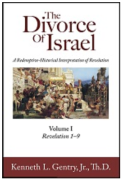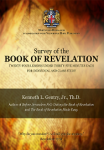WHY JOHN WROTE TO ASIA MINOR
 PMW 2024-080 by Kenneth L. Gentry, Jr.
PMW 2024-080 by Kenneth L. Gentry, Jr.
In my orthodox preterist understanding of Revelation, I see the bulk of John’s drama (as it transpire on the historical plane) as largely focusing on the destruction of Jerusalem in AD 70. Many opponents of this strong Judaic focus complain that we cannot explain John sends Revelation to Asia Minor (Rev. 1:4, 11; 2:1–3:22). It would seem that the message should be sent to Jerusalem. Why did John send his message on the destruction of the temple and Jerusalem to Christians in Asia Minor? The seven churches were not only several hundred miles away from Jerusalem, but were in non-Jewish territory well outside of Jewish Palestine.
There are several reasons for John’s directing his seven letters (actually “oracles”) to Asia Minor. I will briefly summarize a few.
First, John ministered to the seven church in Asia Minor. We can see from his seven oracles within that he knew the churches well. So, as their minister, he directs his dramatic message to them.
Second, the “capital” of Christianity was in Jerusalem, where Christianity began and first ministered (e.g., Luke 24:46-53; Acts 1, 4; 2:14; 5:16; 6:7). We can see Jerusalem’s strong influence over the nascent Christian faith in Acts 15, where we find the Jerusalem council setting policy for the church (Acts 15:1–2).
The Divorce of Israel: A Redemptive-Historical Interpretation of Revelation
This long-awaited commentary has now been published. It is an 1800 page, two-volume deeply exegetical, academic commentary on the Bible’s most mysterious book.
Click: https://www.kennethgentry.com/the-divorce-of-israel-2-vols-by-gentry-pre-publication-offer/
See more study materials at: www.KennethGentry.com
Third, since Jerusalem was originally the “capital” of Christianity, Christians everywhere would need to know why Jerusalem was destroyed and what that meant for the Christian faith. Was the Christian faith to be a temporary movement that would soon fade away with the demise of its central city and church? John explains this in the Revelation.
Fourth, when John wrote, a great percentage of Christians were of Jewish heritage. They would be under intense pressure from their families in their homes+ and their religious associates in their occupations. They would need to know why the temple and Jerusalem were destroyed, bringing an end to historic Judaism. Judaism underwent radical change when its central temple was destroyed: it transitioned from biblical Judaism to rabbinic Judaism.
Fifth, the churches in Asia Minor would be under the persecution that John highlights in Revelation. This persecution would arise from both Rome and Jerusalem. They would need to see that God’s hand is behind all of this. They need to hear the Spirit’s call to endurance despite their grievous circumstances: they must endure and overcome (Rev. 2:7, 11, 17, 26; 3:5, 12, 21). The Epistle to the Hebrews shows that many Jewish Christians were apostatizing from the faith under persecutional pressure (Heb. 10:32–11:39).
Four Views on the Book of Revelation
(ed. by Marvin Pate)
Helpful presentation of four approaches to Revelation. Ken Gentry writes the chapter on the preterist approach to Revelation, which provides a 50 page survey of Revelation .
See more study materials at: www.KennethGentry.com
Sixth, though John addresses his “letters” to seven churches, they are not meant only for those individual churches. For the letters were intended for “all the churches” (Rev. 2:23; cp. 2:7, 11, 17; 2:29; 3:6, 13, 22; 22:16). This is much like Paul addressing his letters to particular churches or persons, yet their having relevance beyond those particular groups or persons.
Thus. the fact that John wrote to seven churches in Asia Minor does not undermine the preterist’s interpretation of Revelation.

Survey of the Book of Revelation
(DVDs by Ken Gentry)
Twenty-four careful, down-to-earth lectures provide a basic introduction to and survey of the entire Book of Revelation. Professionally produced lectures of 30-35 minutes length.
See more study materials at: www.KennethGentry.com
Kenneth L. Gentry Jr.'s Blog
- Kenneth L. Gentry Jr.'s profile
- 85 followers



